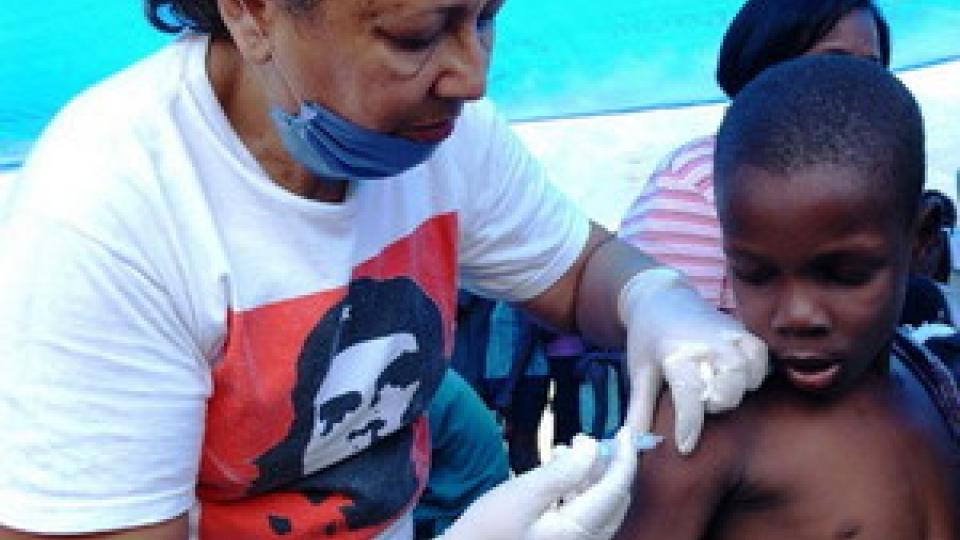Accessible healthcare for all

In our “A World to Win” series, Resistance: Young Socialist Alliance seeks to give voice to the ideas and demands of radical young people involved in the struggle to make the world a better place.
In this week's article, Jacob Andrewartha argues for universal quality healthcare for all.
* * *
Article 25 of the Universal Declaration of Human Rights states: "Everyone has the right to a standard of living adequate for the health and well-being of himself and of his family, including food, clothing, housing and medical care and necessary social services”. The reality is that universal accessible healthcare is hindered by the unequal distribution of wealth under capitalism. Increasingly, high-quality healthcare is for those who can pay for it and low-quality or no healthcare is for those who cannot afford it. In the US, despite it being a very rich country, access to healthcare is based on a private insurance model where the insurer determines the level of care, or by costs being paid upfront by the individual if they have no insurance. However, it is estimated that more than 45.7 million Americans, 15.3% of the population, lack access to health insurance. These are typically people from lower socio-economic backgrounds and other marginalised social groups. A consequence of this inequality in healthcare, according to a study published by the American Journal of Public Health in 2009, is that more than 45,000 people in the US suffer preventable deaths linked to a lack of access to healthcare. Such deaths could have been avoided if the human right of universal healthcare were embraced by governments rather than treating healthcare as a privilege afforded only to the rich. In Australia the Gough Whitlam government introduced a publically-funded healthcare system, which entitled residents to primary healthcare at a subsided cost. While the system allowed for more equitable health care outcomes it was not a truly universal healthcare system. Now our public health system is slowly being withered away by successive Liberal and Labor governments. Last year, the federal government tried to introduce a $7 “co-payment” for all GP and hospital visits. While the reform failed to pass the Senate, the government is still discussing possible cuts to Medicare and a smaller co-payment which may be introduced in legislation in the future. A key limitation to our current public health system is that it is supplemented by a Private Health Insurance Rebate, by which the government funds up to 30% of the cost of private health insurance. This is often justified on the basis that it takes pressure off the public health system, but there is little evidence that this is the case. Instead it contributes to the inequality of healthcare across the country, and ensures better quality of care and services for those who can afford it. A fairer and more equitable system of healthcare would eliminate government subsidies to private health insurance providers and progress towards a free public service model that guaranteed quality free healthcare for all. Health inequality and lack of access to adequate healthcare impacts disproportionately on Aboriginal and Torres Strait Islander people, resulting in a life expectancy 17 years less than non-Aboriginal Australians. One of the causes of this gap in life expectancy is that Aboriginal health is underfunded by at least $500 million annually. Access to quality healthcare in remote communities is also limited by lack of funding. This gap in health outcomes between Aboriginal and non-Aboriginal people can only be solved with radical change that allows for self-determination and full funding of Aboriginal and Torre Strait Islander health services. The high cost of some pharmaceuticals presents barriers to adequate healthcare for many people. A recent example of this is the case of Martin Shkreli. He obtained the patents for a number of lifesaving drugs, including a drug used to treat patients with malaria, some cancers and AIDS. Shkreli, motivated by the need to increase profits, raised the price of the drug from $13.50 to $750, a 500% mark-up. While Shkreli was heavily criticised, his actions should not be seen as an aberration. Rather they are a by-product of an economic system that prioritises profit over human need. Shkreli's actions reflect a contradiction in how a human necessity, such as medicine, is commodified and seen as a way to produce a profit rather than serve human need. Cuba, a country that provides free and universal healthcare, is an example of what an alternative health system could look like if it were separated from the profit motive, and instead designed to serve the needs of its citizens. The successes of Cuba's healthcare system include a life expectancy of 78 years and an infant mortality rate lower than the US. Its doctor-patient ratio of 1:190 is considerably better than the Australian doctor patient ratio of 1:313 (based on 2011 ABS statistics). Cuba also demonstrates solidarity with other nations by providing them with medical assistance — currently 28,000 health professionals trained in the Cuban health system are serving in more than 68 countries. Cuba's doctors have achieved inspiring medical breakthroughs despite its status as a poor Third-World nation. A country like Australia or the US could learn a lot from the example of Cuba in how to implement a healthcare system. We need to fight for a better world where healthcare is a fundamental human right and provided free to everyone. The example of Cuba demonstrates that a truly just healthcare system cannot be achieved without making a fundamental break from capitalism and moving towards socialism instead.